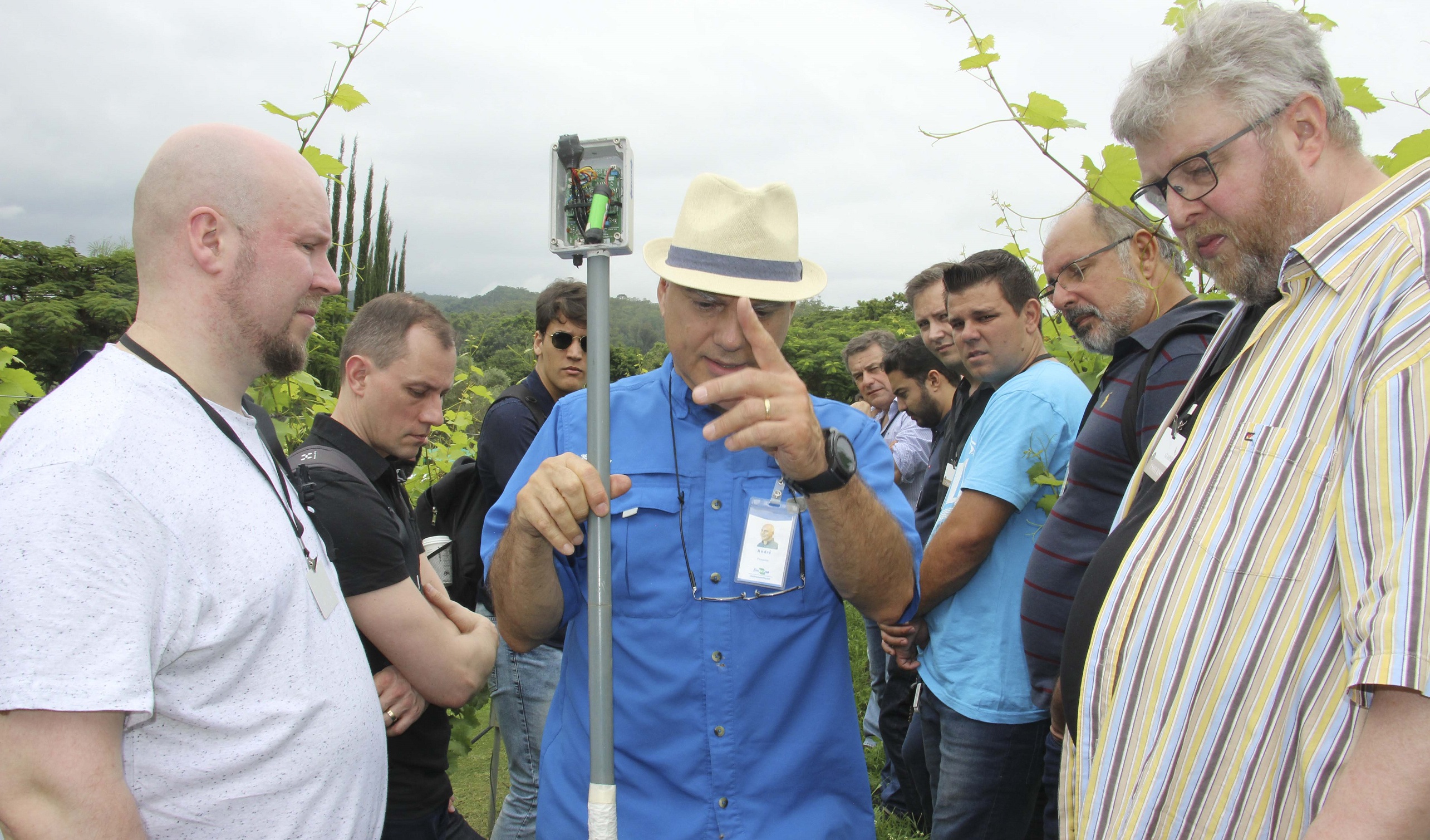Researchers discuss implementation of pilot project for precision irrigation
Researchers discuss implementation of pilot project for precision irrigation
Researchers who are members of the Smart Water Management Platform (SWAMP) met on Wednesday (04) to plan the implementation of an IoT-based sensing and control system to manage the use of the water in pilot projects in Brazil's Southeast and Northeast. The pilots should be implemented by the end of 2018.
The activities established by project, which was approved in the 4th Brazil-European Union Joint Call for Information and Communication Technologies (ICTs) in the past year, started in early 2018, with the initial specifications of the pilots and the system's computational architecture, which will be installed in a wineyard in the countryside of São Paulo and in a farm in the Matopiba region.
The meeting occurred at Embrapa Instrumentation (São Carlos, SP), which integrates the project with the researchers André Torre Neto, Luis Henrique Bassoi and the analyst Ednaldo José Ferreira, who met with the SWAMP coordinator in Brazil, Carlos Alberto Kamienski, from the Federal University of ABC (UFABC), and the researcher from Embrapa Agricultural Informatics, Marcos Cezar Visoli.
According to Kamienski, the meeting also had the aim to evaluate the progress obtained by the project. “We have been watching the advances in the development of sensors for precision irrigation, and discussing the future agenda, the schedule for the next steps, the planning for the implementation of the pilot project and the development of the experiments' architecture”, he stated.
Torre Neto believes that at the end of 2018 the two selected regions in Brazil will already have their pilots implemented. “The sensors installed at the properties are going to send data from the croplands to the cloud, and from there to a central office, for farmer decision making”, he affirmed.
Platform for rational water management
SWAMP is led by UFABC, with the participation of 11 institutions. These include the Federal University of Pernambuco (UFPE), the Ignatian Educational Foundation "Padre Sabóia de Medeiros" University Center (FEI), Embrapa, the University of Bologna in Italy, Intercrop from Spain, and the VTT Technical Research Centre from Finland. Two projects will be developed in Brazil and another two in Europe.
The project stipulates the development and assessment of a smart variable rate irrigation (VRI) platform, initially for central pivots and localized irrigation, in soybean production and viniculture, respectively. The platform will be integrated with management tools and apps aimed at the rational use of water.
The proposal is to provide farmers with a daily dynamic map of recommendations, according to real-time information obtained by the platform about the weather, soil, cultivation conditions, and about the levels and quality of the water supply and distribution systems in the field.
The Smart Water Management Platform (SWAMP) is due to be implemented within three years, beginning in December 2017, and entails 1.5 million euros in funds (around 5.5 million reais) for Brazilian institutions. Approximately 1.2 million reais, 24% of the total, will be allocated to Embrapa. Besides that sum, the corporation is going to receive the input of another million reais due to the equipment and services that will be shared.
Embrapa will be responsible for leading the implementation and the evaluation of two pilot units stipulated by the project. In addition, it is going to collaborate with research, jointly with Brazilian and European researchers, to overcome the challenges of the instrumentation and construction of the computational platform for the collection, integration, storage, processing and visualization of data derived from the experiments.
A pilot unit on smart irrigation will be set up in the Matopiba region, considered the next major national agricultural frontier, which encompasses the Cerrado biome of the states of Maranhão, Tocantins, Piauí, and Bahia, and accounts for a large portion of the Brazilian production of grains and staple fibers. The other experiment will comprise vinicultural research and is programmed to be installed in a vineyard in the countryside of São Paulo state.
Translation: Mariana Medeiros
Joana Silva (MTb 19.554/SP)
Embrapa Instrumentation
Press inquiries
instrumentacao.imprensa@embrapa.br
Phone number: +55 16 2107 2901
Nadir Rodrigues (MTb/SP 26.948 and MS 15.188)
Embrapa Agricultural Informatics
Further information on the topic
Citizen Attention Service (SAC)
www.embrapa.br/contact-us/sac/

